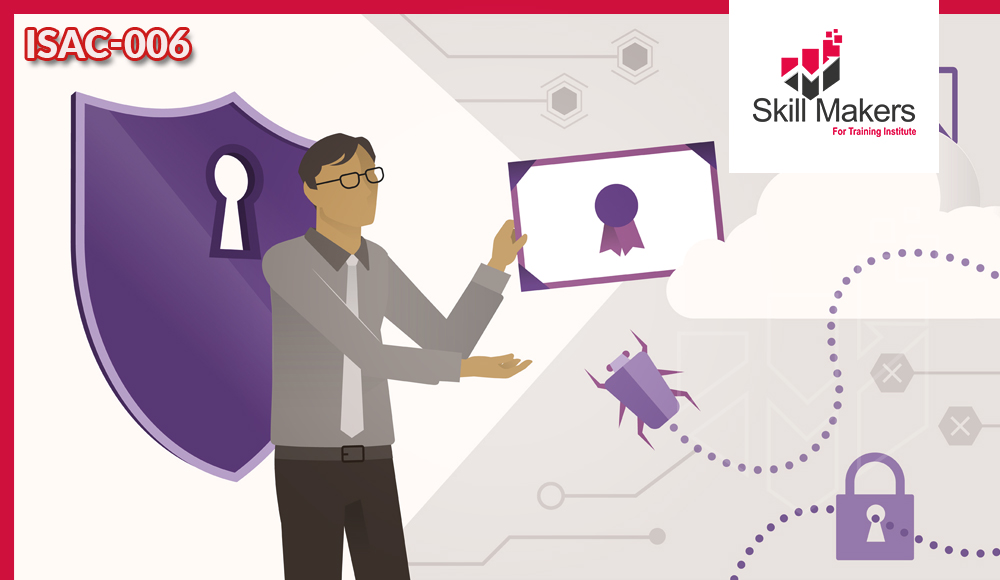-
Course Code
ISAC-006

Certified Information Security Manager (CISM)
- The Certified Information Security Manager (CISM) certification is a unique management-focused certification that has been earned by more than 20,000 professionals since its introduction in 2004. Unlike other security certifications, CISM is for the individual who manages, designs, oversees and assesses an enterprise's information security. The demand for skilled information security management professionals is on the rise. Earning a CISM designation will give you a competitive advantage. Many enterprises and government agencies increasingly recognize, require and expect there IS and IT professionals to hold this certification.
Learning Outcomes
- Maintain an individual’s competency by requiring the update of existing Skill Makers and skills in the areas of information systems auditing, management, accounting and business areas related to specific industries (e.g., finance, insurance, business law, etc.)
- Provide a means to differentiate between qualified CISMs and those who have not met the requirements for continuation of their certification
- Provide a mechanism for monitoring information systems audit, control and security professionals maintenance of their competency
- Aid top management in developing sound information systems audit, control and security functions by providing criteria for personnel selection and development
- Provide an environment in which security professionals can acquire, thoroughly and properly, the skills and Skill Makers expected of a world class information security manager
- To maximize your prospects at the CISM exam if you choose to sit it
Course Contents
- Skill Makers Statements
- Introduction to Information Security Governance
- Effective Information Security Governance
- Governance and Third-Party Relationships
- Information Security Metrics
- Information Security Governance Metrics
- Information Security Strategy
- Information Security Strategy Development
- Strategy Resources and Constraints
- Other Frameworks
- Compliances
- Action Plans to Implement Strategy
- Governance of Enterprise IT
- Information Risk Management
- Task and Skill Makers Statements
- Risk Management Overview
- Risk Assessment
- Information Asset Classification
- Assessment Management
- Information Resource Valuation
- Recovery Time Objectives
- Security Control Baselines
- Risk Monitoring
- Training and Awareness
- Information Risk Management Documentation
- Task and Skill Makers Statements
- Information Security Program Management Overview
- Information Security Program Objectives
- Information Security Program Concepts
- Information Security Program Technology Resources
- Information Security Program Development
- Information Security Program Framework
- Information Security Program Roadmap
- Enterprise Information Security Architecture (EISA)
- Security Program Management and Administration
- Security Program Services and Operational Activities
- Security Program Metrics and Monitoring
- Measuring Operational Performance
- Common Information Security Program Challenges
- Task and Skill Makers Statements
- Incident Management Overview
- Incident Management Procedures
- Incident Management Resources
- Incident Management Objectives
- Incident Management Metrics and Indicators
- Defining Incident Management Procedures
- Business Continuity and Disaster Recovery Procedures
- Post Incident Activities and Investigation
- ISACA Code of Professional Ethics
- Laws and Regulations
- Policy Versus Law Within an Organization
- Ethics and the Internet IAB
- Certified Information Security Manager
- Certification requirements
- CISM in the Workplace
- The CISM Priorities
- Understand How Questions Are Structured
- Preparing for the Examination
- Recommended Reading for the CISM Exam
Domain 1 – Information Security Governance
Domain 2 – Information Risk Management and Compliance
Domain 3 – Information Security Program Development and Management
Domain 4 – Information Security Incident Management
Our Methodology
- Make coaching and monitoring innovative and using modern
- Media training also using on the go training by using interactive means and focusing on
- The exercises, practical applications and real situations study
- Live delivery method, instructor-led training
- Experienced consultant, trainers, and professional
- Qualified trainer with high-level experience
Attendance Reports
- Send daily attendance reports to training departments
- Send full attendance report to training dep. by the end of the course
- Attend 100 % from the course days also provide daily
- Issue attendance certificate for participant who attend minimum 80% from the course duration
Pre/Post Reports
- Pre- assessment before starting training
- Post assessment after finish training
- Full report for the deferent between Pre-& Post assessment
Who Should Attend
- Senior Executives, IT managers
- Information Security Professionals
- IT Software System
- Application Developers and IT Auditors
